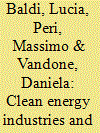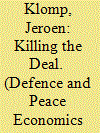| Srl | Item |
| 1 |
ID:
127870


|
|
|
|
|
| Publication |
2014.
|
| Summary/Abstract |
In the last few years, rare earth materials (REM) prices have experienced a strong increase due to geopolitical and sustainability issues. Financial markets could already have factored in concerns about shortages of REM supplies into clean energy companies' valuations. We use a multifactor market model for the period January 2006 to September 2012 to analyze the impact of REM price trends - specifically dysprosium and neodymium - on six clean energy indices (NYSE-BNEF) tracking the world's most important companies in the clean energy sector. The results show that during period of price increase, there is a negative relationships between REM price changes and the stock market performance of some clean energy indices. The European clean energy index is also negatively affected, and this effect could be relevant to policy makers, considering that Europe is implementing some relevant policy actions to support the development of the clean energy industry.
|
|
|
|
|
|
|
|
|
|
|
|
|
|
|
|
| 2 |
ID:
101686


|
|
|
|
|
| Publication |
2010.
|
| Summary/Abstract |
This article studies the effects of conflict onset on asset markets applying the event study methodology. The authors consider a sample of 101 internal and inter-state conflicts during the period 1974-2004 and find that a sizeable fraction of them has had a significant impact on stock market indices, exchange rates, oil and commodity prices. This fraction is inconsistent with pure chance, that is, with the selected probability of type-I errors in our tests of statistical significance. The results suggest that, on average, national stock markets are more likely to display positive than negative reactions to conflict onset. When the authors distinguish between internal and inter-state conflicts, they find that the fraction of significant results is higher for international conflicts. When the authors classify events according to the region where they occur, they find that Asia and the Middle East are the regions where conflicts tend to have the strongest effects. Finally, the article reports evidence that abnormal returns would have accrued to investors systematically exploiting conflict onset to implement conflict-driven strategies. Results are robust to selecting a subset of high-intensity conflicts and to expanding the time window over which conflict events are defined. The findings of the article confirm the economic importance of the effects of conflicts on asset markets.
|
|
|
|
|
|
|
|
|
|
|
|
|
|
|
|
| 3 |
ID:
185491


|
|
|
|
|
| Summary/Abstract |
On October 2nd, 2018, Jamal Khashoggi, a journalist and critic of the Saudi Arabian regime, disappeared after a visit to the Saudi Arabian consulate in Turkey nd was most likely murdered shortly afterwards. After this incident, a period of uncertainty started about whether or not a major arms deal that was signed between the United States and Saudi Arabia would still going to be approved by Congress or in turn will be rejected. The main findings presented in this study clearly demonstrate that the uncertainty surrounding the deal caused a significant drop in the daily return on the equity prices of US defense firms. This result suggests that investors believe that it is very likely that the major arms deal will be blocked by Congress in the short-run thereby reducing the business perspectives of the US defense-related industry. Besides these findings also imply that investors expect that the US president will not use its veto power or make permanently use of the exemption clause provided in the US arms trade legislation.
|
|
|
|
|
|
|
|
|
|
|
|
|
|
|
|